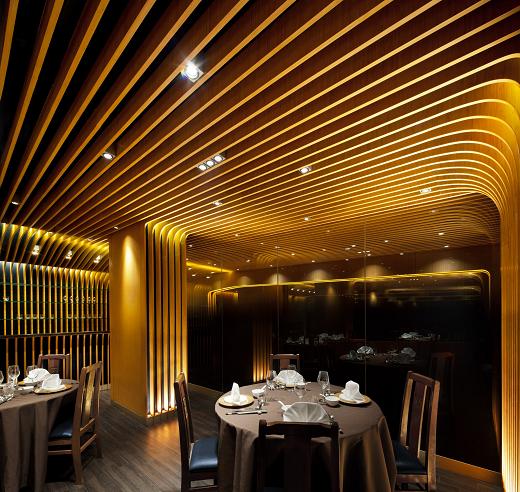 Pak Loh is a traditional, Hong Kong based family restaurant specialised in Chiu Chow style Chinese food. For over 45 years its highly successful flagship restaurant has been located in the heart of a building block in Hong Kong’s Causeway Bay district. This project involves the renovation of the restaurant’s public entrance area and the replacement of its front Lo Mei food preparation area with a high-end VIP dining room / lounge area.
Pak Loh is a traditional, Hong Kong based family restaurant specialised in Chiu Chow style Chinese food. For over 45 years its highly successful flagship restaurant has been located in the heart of a building block in Hong Kong’s Causeway Bay district. This project involves the renovation of the restaurant’s public entrance area and the replacement of its front Lo Mei food preparation area with a high-end VIP dining room / lounge area.
The new VIP room is located in front of the restaurant at the building block’s façade, and is disconnected from the restaurant’s main entrance by a public passageway. Thus, this very small and intimate private room is fully surrounded by publically accessible space. This condition was grasped as an opportunity to engage those passing by in a unique and playful visual theatre: all designed elements work together to create an interaction between Causeway Bay’s busy street-life and the restaurant hidden deep inside in the building block. This happens by working with a continuity of the space’s geometrical elements, by amplifying perspectival views and a by a play with transparencies and reflections. Through the subtle revealing of hints of the VIP dining experience to the outside, potential clients are seduced and enticed to enter the space.
The main feature of the project is its series of 75 parallel, continuously undulating, curvy bamboo fins. These are combined with parallel mirrors on opposing walls, which visually enlarge the very narrow passage space and create a dynamic perspective that draws visitors’ gaze towards the restaurant’s main entrance. The geometric challenge of the project reveals itself in the subtle sectional variation of the dynamic space. Here one can see the gradually changing continuous curvature of the fins, of which the fronts create a flat, single and double curved surface. All fins are CNC (computer numerically controlled) milled from a flat sheet and can thus easily have accurately cut curved edges. The back surfaces on which these fins were mounted are also made from flat sheet material, which has been grooved in particular areas to allow it to be bent. This method reduced the geometric possibilities there to single curved cylindrical or conical surfaces. These complex surfaces were strategically used only in the corners of the room, where they were combined with built-in lighting. Inside the VIP-room the back-surfaces are finished with a dark blue fabric, which contrasted starkly with the light colour of the bamboo finishing of the fins, allowing the geometric patterns to emerge more strongly. The separation of discreet building elements as columns, walls and ceiling is abandoned as the undulating ceiling blends in fluidly with columns and walls through slumped edges of which the effect is amplified with the use of mirrors. Structure, lighting, television, and air-conditioning are built into the fin-system to provide an undisturbed spatial continuity. The concealed window behind the façade allows a filtered connection of the VIP room’s interior with the street, while the corridor window with gradient transparency print provides privacy to the diner party while the ceiling pattern is allowed to continue. Concealed, heavy, dark blue curtains allow the room to be fully enclosed from curious views.
______________________________________________________________
Laboratory for Explorative Architecture & Design Ltd. www.l-e-a-d.pro
The elegance of the curves, the disappearance of space-limiting elements such as corners or walls through the use of mirrors and fins, the seductive game of exposure and concealment, all work together in giving the VIP room a status of exclusivity. By revealing glimpses of this experience, the space is to trigger curiosity with those who catch a glimpse of what happens inside this intimate, luxurious private room.
